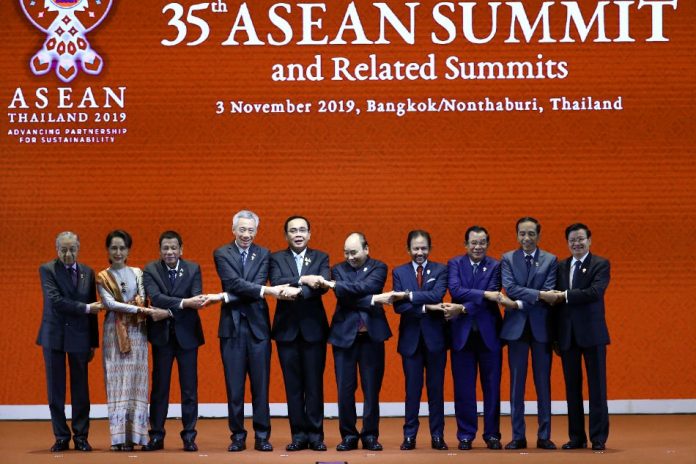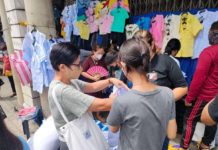
BANGKOK – Southeast Asian leaders meet for a second day in Thailand on Sunday, hoping for a breakthrough in talks over the world’s largest trade deal to help throw off the torpor which has gripped the global economy since the United States (US) and China tariff war began.
The 10-member Association of Southeast Asian Nations (ASEAN) opened its annual summit in Bangkok on Saturday hoping to secure a China-backed free-trade pact at the three-day event, which knits together half the world’s population and around 40 percent of its commerce.
For seven years, the group has been wrangling over a deal spanning from India to New Zealand called the Regional Comprehensive Economic Partnership (RCEP).
Though it is now seen as an urgent counterpoint to US protectionism, one senior trade delegate from the Philippines said a deal appeared unlikely before next year.
Washington’s trade rumble with Beijing has weighed on markets, with the International Monetary Fund warning the spat could cut global growth to the slowest pace in more than a decade.
Meanwhile, US president Donald Trump’s protectionist rhetoric has spooked some ASEAN nations, which fear their economies could fall under his crosshairs.
Trump has repeatedly warned of further intervention to protect US businesses, and several Asian nations are waiting to find out if Washington will place them on a watch list of “currency manipulators.”
Malaysian prime minister Mahathir Mohamad warned that the regional bloc could hit back against any punitive trade measures, but he skirted over specifics.
“We will do exactly what Trump does,” he told a business forum ahead of the summit opening, calling the US leader “not a very nice man.”
“If you go alone, you will be bullied. We don’t want to go into trade war, but sometimes when they do things that are not nice to us, we have to be un-nice to them,” he added.
Earlier, his Thai counterpart, Prayut Chan-O-Cha, echoed the theme of regional cooperation on the RCEP deal, while Philippines’ Trade secretary Ramon Lopez said he hoped to have a “very positive report (on RCEP) come Monday” when the summit ends.
But the treaty’s signing would happen only “within next year,” he added, with members meeting in February to sort out “pending issues on market access.”
Separately, FIFA president Gianni Infantino signed a letter of intent with ASEAN leaders emphasizing a school program “to foster life skills and physical education” through football regionwide, the sport’s governing body said in a statement.
Tensions at sea
India, whose Prime Minister Narendra Modi is also in Thailand, poses the greatest obstacle to RCEP in its current form.
New Delhi fears opening key industries such as metals, textiles and dairy to cheaper Chinese imports.
Indian intransigence has cast the deal – looping in the 10 Southeast Asian economies along with Japan, India, China, New Zealand and Australia – into doubt.
“We want them (India) to be in. We want to have them…they are a big economy,” Lopez told reporters.
Chinese premier Li Keqiang will attend the meeting as simmering tensions in the South China Sea also lead the agenda.
China supports RCEP as a way to assert its trade dominance in its Asian backyard after Donald Trump pulled the United States out of the Trans-Pacific Partnership (TPP) in 2017.
The ASEAN summit follows a push by Washington and Beijing for a partial agreement to squash some of the tit-for-tat tariffs on billions of dollars’ worth of goods that have rattled both economies.
But Washington has pared back its delegation to Bangkok this year.
In what is being read by some as a snub to ASEAN, the United States is being represented by national security advisor Robert O’Brien and commerce chief Wilbur Ross.
US vice president Mike Pence attended last year’s ASEAN summit in Singapore, and Trump was at the 2017 meeting in the Philippines.
A senior White House official rejected the notion of a snub, saying Trump and Pence are unavailable because they are “very engaged in campaigning” for a string of governors’ races.
Trump trusts O’Brien “to go out and take care of big problems and small problems,” the official added. (Agence France-Presse)



